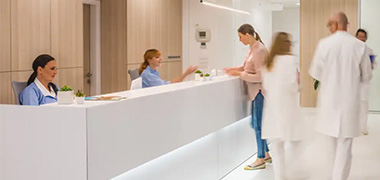
This role has a high level of AI exposure. While some human skills are required, many tasks could be automated or replaced by new technology.
Explore all careersA Medical Receptionist manages administrative tasks in a healthcare setting, including handling calls, scheduling appointments, and ensuring patient confidentiality.
Get qualified to work as a Medical Receptionist with a course recognised across Australia. Speak to a training provider to learn more.
Browse occupations related to Medical Receptionist
In Australia, a full time Medical Receptionist generally earns $1,300 per week ($67,600 annual salary) before tax. This is a median figure for full-time employees and should be considered a guide only. As you gain more experience you can expect a potentially higher salary than people who are new to the industry.
 Courses.com.au Team
Courses.com.au Team
The number of people employed in this field of work has increased in recent years. There are currently 46,700 people working as a Medical Receptionist in Australia compared to 42,000 five years ago. Medical Receptionists may find work across all regions of Australia.
Source: Australian Government Labour Market Insights
 Courses.com.au Team
Courses.com.au Team
If a career as a Medical Receptionist interests you, consider enrolling in a Certificate III in Business Administration (Medical). This course will give you the skills to interpret medical terminology, manage patient records and process medical accounts. A Certificate III in Health Administration may also be appropriate.
 Courses.com.au Team
Courses.com.au Team



A Medical Receptionist works in the office of a hospital, health clinic or medical practitioner. You’ll perform administrative duties such as answering phone calls, dealing with patient enquiries and processing payments. Medical Receptionists make patient appointments and might have to schedule appointments with specialist medical consultants.
Medical Receptionists should be excellent communicators and be able to speak with patients from a range of backgrounds. It’s important that you provide good customer service and maintain patient confidentiality. Medical Receptionists should be organised and able to hand several tasks at once. You’ll need to prioritise your tasks and manage your time well.